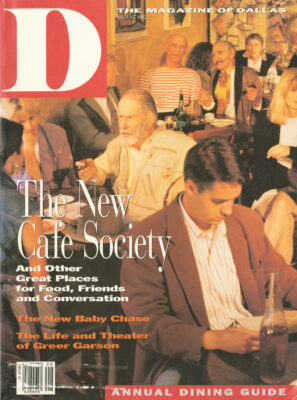It’s like one of those nightmares where something has gone wrong and everything you do makes it worse. The lights blind me as I look toward the host. Stripped of my glasses (the glare, you know), I can’t really see him, but he’s there, strafing me with questions that seem either nasty, irrelevant or both.
It’s the interview from hell, a baffling plunge from wisecrack to dead end to ambush, ending with the coup de grace: questions about salary and extramarital affairs-after I thought the cameras had stopped rolling.
Along the way, we meander through my misspent youth as a rock musician, the alleged sins of this magazine (why so many pretty women on the cover?), the coming death of the written word, etc. He wants quick, easy answers to terribly complex questions. “What’s the number one problem facing the city right now?” he wants to know. “What do you think of Ross Perot?” (As what? Candidate? Patriot? Private eye?)
Well, 1 asked for it. I went to Fairchild/ LeMaster, Inc., communications consultants, to learn more about the ways such folk prepare politicians and business people to meet the press. Lucky for me, this fiasco was only a videotaped exercise designed to show how many things can go wrong for the unwary interviewee.
As two of the leaders in the field of “crisis communications,” Lisa LeMaster and her husband, Ken Fairchild, have spent the past 12 years counseling clients great and small, including the Coors brothers (for a “60 Minutes” grilling); Cowboys owner Jerry Jones (for a session with Sam Donaldson); and former Dallas police chief Mack Vines (before and after his indictment). Politicians they’ve aided include Republicans Bill Clements and Steve Bartlett, and Dallas State Rep. Steve Wolens, a Democrat.
For a long time, I’ve been leery of the experts who stand guard between the leaders and the led: those communications consultants, spin doctors and image polishers who pontificate on endless C-SPAN gabfests. Fairchild says that today, many people define a “politician” as someone who won’t answer a question. True, but that’s at least partly the fault of the puppet masters who pull the candidates’ strings. Consultants, debate pros, marketing aces, demographers and pollsters have made the spontaneous answer an endangered species.
So I feel like I’ve entered the lair of the enemy, though all the paranoia is on my part. LeMaster and Fairchild are smart, friendly and open to my questions. They make two points early on: They don’t consider themselves at war with the press; they just want their clients to understand how reporters think and what they want. And they never tell a client what to say, only how to say it. Their forte is technique; the client must supply the substance.
As LeMaster later noted, my first mistake was yielding all my rights to the interviewer. I made no effort to find out what we were going to discuss, what “slant” he might have, what he already knew or didn’t know about me and D Magazine, When they told me to take off my glasses (just a ploy to upset me, it turned out), I didn’t protest and insist they arrange the lights some other way. I was a passive hunk of meat ready to be processed.
By showing clients how to handle negative questions, how to “bridge” to their own message, etc., Fairchild and LeMaster try to create a level playing field for their clients, arming them to take an active role in shaping the encounter. Journalists focus on our right to do our work and the public’s right to know; LeMaster looks out for the third party in the communications triangle: the subject, who also has a right to ask what’s in it for him. They teach the irrefutable truth of the media age: If you don’t define yourself, someone else will do it for you.
There’s nothing sinister about both sides having an agenda in an interview. The press is not wholly altruistic, so why should our subjects be? But let’s hope that once the playing field is level, people will start talking to each other, not past each other.
How many interviews with politicians have you seen where there was no exchange of ideas, no illumination? To go along with the perceived gridlock in Washington, we’ve also hit rhetorical gridlock, Reporters dish up loaded “gotcha” questions (“Mr. Perot, don’t you hate the Constitution?”) while politicians give token answers and hustle toward safe ground.
No wonder so many people, sick of its malice and tedium, long to be delivered from politics. Both sides plod through their motions like actors in a long-running play, but we sense the artifice. Even when someone declares himself “shocked” or “appalled” at such-and-such, we know it’s part of the act.
The press has run the show for too long, many believe. Now, thanks to pros like Fair- child and LeMaster, both sides are more evenly matched. But there’s irony here: The press has gotten so good at jabbing, and the politicians so good at counterjabbing, that nobody’s listening anymore. The pols are sick of the media. The media are sick of the handlers. So the politicians have fled to Larry King and the radio talk shows, where they take calls from ordinary folks who are pret ty sick of the whole mess. Perhaps we’ve all done our jobs too well.
Get our weekly recap
Brings new meaning to the phrase Sunday Funday. No spam, ever.
Related Articles

Arts & Entertainment
Finding The Church: New Documentary Dives Into the Longstanding Lizard Lounge Goth Night
The Church is more than a weekly event, it is a gathering place that attracts attendees from across the globe. A new documentary, premiering this week at DIFF, makes its case.
By Danny Gallagher

Football
The Cowboys Picked a Good Time to Get Back to Shrewd Moves
Day 1 of the NFL Draft contained three decisions that push Dallas forward for the first time all offseason.


